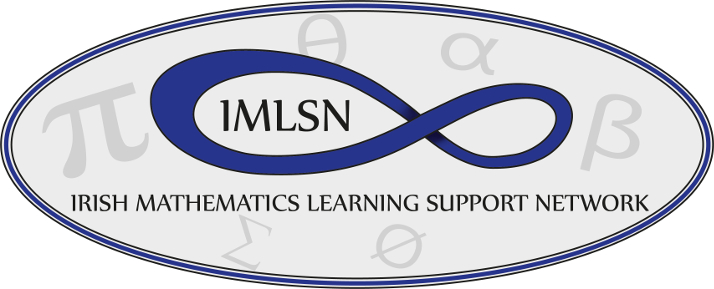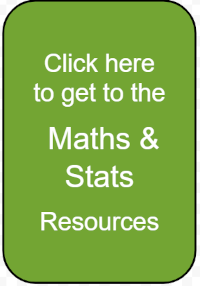“ Mathematics and Statistics Support post-COVID: Renewal, Redesign and Expansion”
A report on the Irish Mathematics Learning Support Network (IMLSN) Workshop 2023
On Friday June 9th the IMLSN held the hybrid workshop ‘Mathematics and Statistics Support post-COVID: Renewal, Redesign and Expansion’ via zoom and in the Mathematics Support Centre (MSC) at Maynooth University.
The workshop started with four 30-minute presentations, speaker details, titles and abstracts are available towards the bottom of this page. After lunch, there were three ‘Break Out Rooms’, two in-person and one online. Participants, from across Ireland and the UK, were encouraged to consider:
- The main 'take away' points from the earlier presentations that might inform their own provision for 2023-24.
- The role of networks of maths and stats support (MSS) and what practitioners expect networks should do to help them in their own institutions.
Participants could also discuss any topic they felt relevant following their experience of supporting students over the past year.
A broad range of topics were discussed and are summarized below.
Participants highlighted how reinvigorating it was to meet and support students, particularly first years, in in-person settings. While numbers attending MSCs are still lower than before COVID-19, they are steadily increasing and the importance of reporting on the quality of the student experience along with student numbers was highlighted. The advantages and disadvantages of different MSC venues were also discussed in relation to allowing students sufficient space to study as well as getting help from tutors.
Student engagement with and the effective advertisement of MSS was spoken about at length. It was observed that, in general, students are looking for different types of advertisement, e.g.
- reports/announcements/testimonials from their peers (student ambassadors) who are engaging with MSS,
- descriptions of what students should expect from when they enter the MSC to when they leave,
- QR codes on posters and lecture slides that link to MSC opening times,
- grab student attention in lecture announcements through a comparison of the module grades, broken down by diagnostic test score, of those who engaged with MSS versus those who did not.
Some institutions use diagnostic/screening tests as a method to encourage students to engage with MSS. It was suggested that these tests could be shared across the community and the system ALEKS, an artificially intelligent learning and assessment system, was also discussed in this capacity. Some participants raised the difficulty of finding opening hours that match with student availability, and it was suggested that starting and ending the MSC on the half hour mark might increase the possibly for students to attend (as lectures normally start and end on the hour mark).
Another topic of discussion was the use of online assessment for modules and student use of online calculators for completing assessment. It was agreed that there should be a unified approach across departments in relation to these matters. From the MSS perspective, we witness the pressures that students are under and can understand why they might turn to online tools. We certainly can play a crucial role in advising students on optimal study techniques and on the responsible use of online tools, however, participants were unsure where exactly we should draw the line between doing too much for students and allowing for students’ own personal responsibility. Outside of MSS, it was generally agreed that institutions could provide more incentives for lecturers to reconsider course structures and how assessment is run. A range of related topics were discussed including:
- negative impact of online assessment on student engagement with tutorials and MSS,
- continuous assessment through in-class tests vs online (at home) assessment,
- creating assessments that are not conducive to help from online tools while still noting the need to check basic calculation proficiency,
- students not checking the veracity of online resources they find via search engines,
- negative impact of using recorded lectures with students who have a poor attitude to learning mathematics.
Finally, in relation to networks of MSS practitioners, participants agreed that they play an important role in supporting individual practitioners. Networks facilitate beneficial community events (such as this workshop) and have members who can be contacted for advice.
Aoife Guerin, Ciarán Mac an Bhaird, Aisling McGlinchey, Claire Mullen, Kirsten Pfeiffer.
A pdf of this report can be downloaded here.
Title: A Reflection on a Year of Mathematics and Statistics Support, Post COVID Restrictions
Peter Mulligan (Maynooth University)
Abstract: At the IMLSN workshop 14 in January, we reported on our experiences of our first semester at Maynooth University Mathematics Support Centre since the removal of COVID restrictions. Now that the academic year is over, we take this opportunity to share with the mathematics learning support community our observations and lessons learnt. Among other items, we will report on possible reasons for lower than pre-COVID attendance rates from some year groups and we remark on the impact of online assessment on student engagement with our services. Despite lower than pre-COVID attendance figures, student feedback on our annual survey indicates a high level of student satisfaction with our service. We will also report on our experience of delivering the IMLSN Tutor Competency Badges to tutors in Maynooth University.
One of the positive outcomes for maths learning support from the challenging pandemic years was increased usage and development of excellent online maths resources. A demand for this had been identified and addressed in previous years; however the urgency due to restrictions helped to expedite this development significantly.
In the past academic year, going back to ‘normal’, we were challenged with the task to re-establish the successful face-to-face maths support from pre-pandemic times and at the same time make best possible use of the resources and skills developed during the pandemic. Another major challenge last year was students’ relatively poor engagement, as discussed at the IMLSN Workshop 13, which made it particularly difficult for tutors and lecturers to arouse interest in engaging with supplementary maths resources and exercises. Colleagues reported that students were reluctant to use online support or resources. One of the reasons may be that it can be very time-consuming to find the right resources and exercises.
To support the Irish maths learning support community, the IMLSN Shared Mathematics Resources Project aims to provide easily searchable, reliable and targeted selections of notes, videos and interactive exercises in key topics in mathematics and make them available on the IMLSN-website. Resources are chosen with the Irish context in mind, quick and easy to find, and for most topics, interactive exercises with feedback are provided. It is an ongoing project, from and for the IMSLN community, and we encourage colleagues to participate in the project, and to use it in maths support centres and other teaching.

